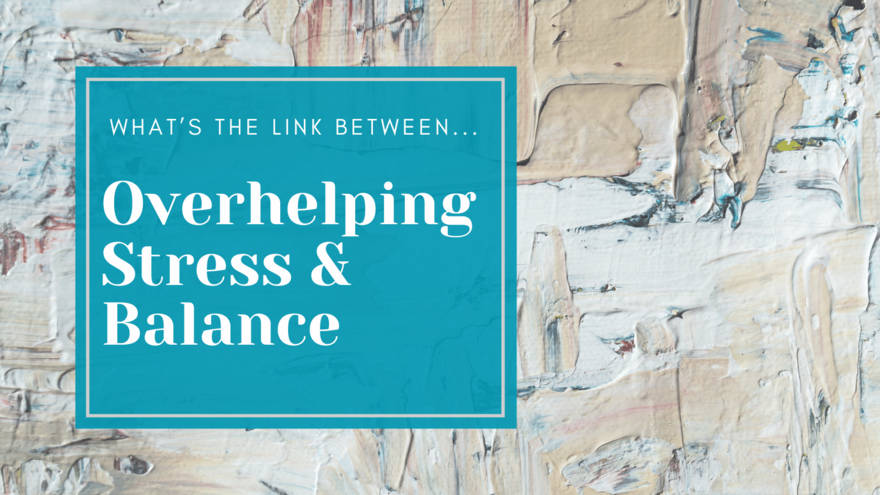The Link Between Overhelping, Stress and Feeling Out of Balance

Have you ever considered that your desire to help others, combined with the urge for everyone to be happy and possibly a fear of not being liked, might be the root cause of your stress and life's imbalance? Today, let's delve into the intricate link between empathy, stress management, and achieving a harmonious work-life balance.
As an authentic business and leadership coach, I've seen how empathy, while a profoundly beautiful trait, can become a double-edged sword. Empathy enables us to understand and share the feelings of others, but when it's overutilized, it might lead us to shoulder responsibilities that aren't ours to bear.
The Overuse of Empathy
The tendency to overhelp stems from an overactive empathy quality. This often results in taking on too much, leading to increased stress and a life thrown off balance. It's not uncommon to find oneself working extra hours or financially overextending to support adult children, actions driven by an empathetic heart yet detrimental to our well-being.
You might be using empathy in an out-of-balance way to overhelp others if:
- You avoid difficult conversations to "keep the peace" or out of fear that the person will get angry with you
- Make continual allowances for the poor performance of an employee
- You tolerate too much at home or work
- You take on tasks and responsibilities of others out of fear they won't do them or won't do them "the way you like"
- You feel like everything in your world depends on you
The Role of Self-Compassion
Conversely, an underactive self-compassion quality usually accompanies overactive empathy. Self-compassion, the inward extension of kindness we easily offer others, is often mistakenly viewed as selfishness. This misperception can skew our self-compassion meter, leaving us with a heightened internal critic and harsh personal standards.
You may have an over-aggressive inner critic if any of these sound familiar:
- I'd be selfish to not do that for them (inner critic posing as a pleaser)
- I can't allow myself any downtime or nothing will get done (inner critic posing as a hyper-achiever)
- I must not have trained them well so I better just do it myself (inner critic blaming you for other people's issues)
- Nobody ever helps me (inner critic posing as a victim)
- I have to do it myself to have it done right (inner critic posing as a perfectionist)
The Power of Self-Awareness
Raising self-awareness about the link between excessive empathy and stress, imbalance, and a harsh inner critic is the first step towards recalibration. It involves recognizing instances where we might be sacrificing our well-being for others, a pattern that can manifest in both professional and personal spheres.
Consider the leader hesitant to provide necessary feedback to an underperforming employee, fearing discouragement, yet ends up bearing the workload themselves. Or the parent still financially supporting capable adult children at their own expense. These scenarios highlight the necessity of assessing whether our help is truly helpful or if it hinders both our and the other person's growth.
It's a great moment to remember the safety directions that happen before every flight. "In case of emergency secure your oxygen mask first before assisting someone else."
Starting Points for Change
Acknowledging areas where we might be overextending ourselves for others is crucial. Increased self-awareness helps you to identify these areas so you can begin putting your oxygen mask on first!
Here are some key questions you can ask yourself?
- Is this person able to do this for themself? (unwilling does not equal unable)
- Am I sacrificing something to do this for them?
- Do I feel resentful or even angry with them for not appreciating what I'm doing?
If you answer yes to any of these questions it's a good indicator that you are overhelping and need to consider a new approach.
Next Steps
Identifying overhelping tendencies is just the beginning. Once we identify the tendencies it's time to learn new habits to upgrade the old outdates ones.
Key steps in moving away from overhelping are learning to hold others include:
- Holding others accountable for their responsibilities
- Setting and maintaining boundaries
- Strengthening your communication skill set to have more authentic genuine conversations
- Work on being as kind and loving to yourself as you are to others.
- Learning to value your emotions as messengers
Change doesn't happen overnight. These deeply ingrained patterns require patience, kindness, and consistent practice to cement new habits in place.
Through coaching, many have found that in just a handful of sessions, it's possible to begin significant shifts in these ingrained habits. New, healthier patterns can be established, significantly reducing stress and restoring balance.
Invitation
What would your life look like if you let go of over helping others? What could you do with the resources (time, energy, money) you free up? Consistent practice of dialing your desire to help and support others back into a healthy balance will lead to reduced stress and a more harmonious balance in all areas of your life.
If today's discussion resonates with you and you're ready to explore these qualities further, I encourage you to reach out. Together, we can work towards taking back control of your life, dialing down the stress, and finding a more balanced and fulfilling path.
Until next time, take care and be well.
Vicki Haddock is an author, professional leadership coach, and inspirer of others to live their best thriving lives! Ready to dive in deeper but not sure where to start? Consider Registering for the Self-Checkin that Vicki hosts quarterly or grabbing a copy of her book Confidence Unchained!


 Watch the Video on Youtube
Watch the Video on Youtube
0 comments
Leave a comment
Please log in or register to post a comment